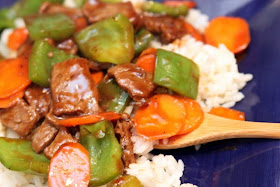I have a guest blogger! I have arrived. Or maybe not. Today's post is from Dave, photojournalist extraordinaire, and owner of Milestones Photography. He is a Dave of all trades, not the least of which is cooking. I've been begging him for a peek inside his kitchen, and he finally relented. I'll let Dave explain in his own words.
P.S. Dave, next time I must insist on a sample before I post your dish. In the interests of quality control.When you find a food that your 2- and 5-year-old girls love (and that you do, too), you want to make that dish as often as possible. Unfortunately, deep-fried onion rings aren't the healthiest thing to make for the family, so they do end up being more of an occasional item.
For a fairly simple food, there is a wide range of breading styles for onion rings, ranging from a light coat of flour or bread crumbs for a thin, crispy onion to a much thicker milk or beer based batter. My taste falls somewhere in between – I prefer the texture of a batter but I don't like it so thick that the onion doesn't crisp up slightly.
Battered Onion RingsMakes 4 servings2 large onions
3 c. flour
1 Tbsp. baking powder
1 Tbsp. garlic powder
2 Tbsp. Creole seasoning
1 1/2 - 2 1/2 c. milk or buttermilk
Canola oil, for frying
1. Slice the onions about 1/4" thick and separate the individual layers into rings. Set aside.

I used Vidalia onions, because they're in season and have a sweeter flavor.
2. Add 2 c. flour to a container that is wide enough for dredging the onions. Add the baking powder, garlic powder, and Creole seasoning. (If you like your food spicy, add another tablespoon of Creole seasoning.)

3. To the dry mixture add the milk, starting with 1 1/2 c., and mix well.
A thicker batter will create a thicker, bread-like coating on the onion, so if you want a thinner, crisper coating, add more milk to thin the mixture. I make my batter so it's thinner than a pancake batter but not so thin as to seem watery.

4. In another shallow container, add 1 c. flour.
This will be used to precoat the onions so the batter will adhere better to the onion and won't pull away when fried.
5. Add enough canola oil to be 1 1/2" to 2" deep, and heat to 350 degrees.

My candy thermometer doubles nicely as a deep-fry thermometer, and I don't deep fry without it. The few times I haven't used it, the oil was either too cold and the food absorbed too much oil, or it was too hot and I ended up with a nicely cooked exterior and raw interior. Bleh.
I love my cast iron Dutch oven and it's perfect for deep frying because it keeps a good, even temperature.
6. Take the individual rings and lightly coat in the plain flour.
Use one hand for this and the other hand for working with the onions in the wet mixture. That way, you'll have one fairly clean hand and another coated in goop.

7. Use a fork or your hand to thoroughly coat the onions in the wet mixture.

8. Carefully place the onions in the hot oil, making sure you don't splash.

9. The cooking time varies, depending on the thickness of the batter. When one side is a light golden brown, flip to cook the other side.

10. Remove and drain on a cooling rack in a sheet pan.

If you'd like to season with additional salt, this is the time to do it. The salt adheres better to the hot rings.
Enjoy!

























